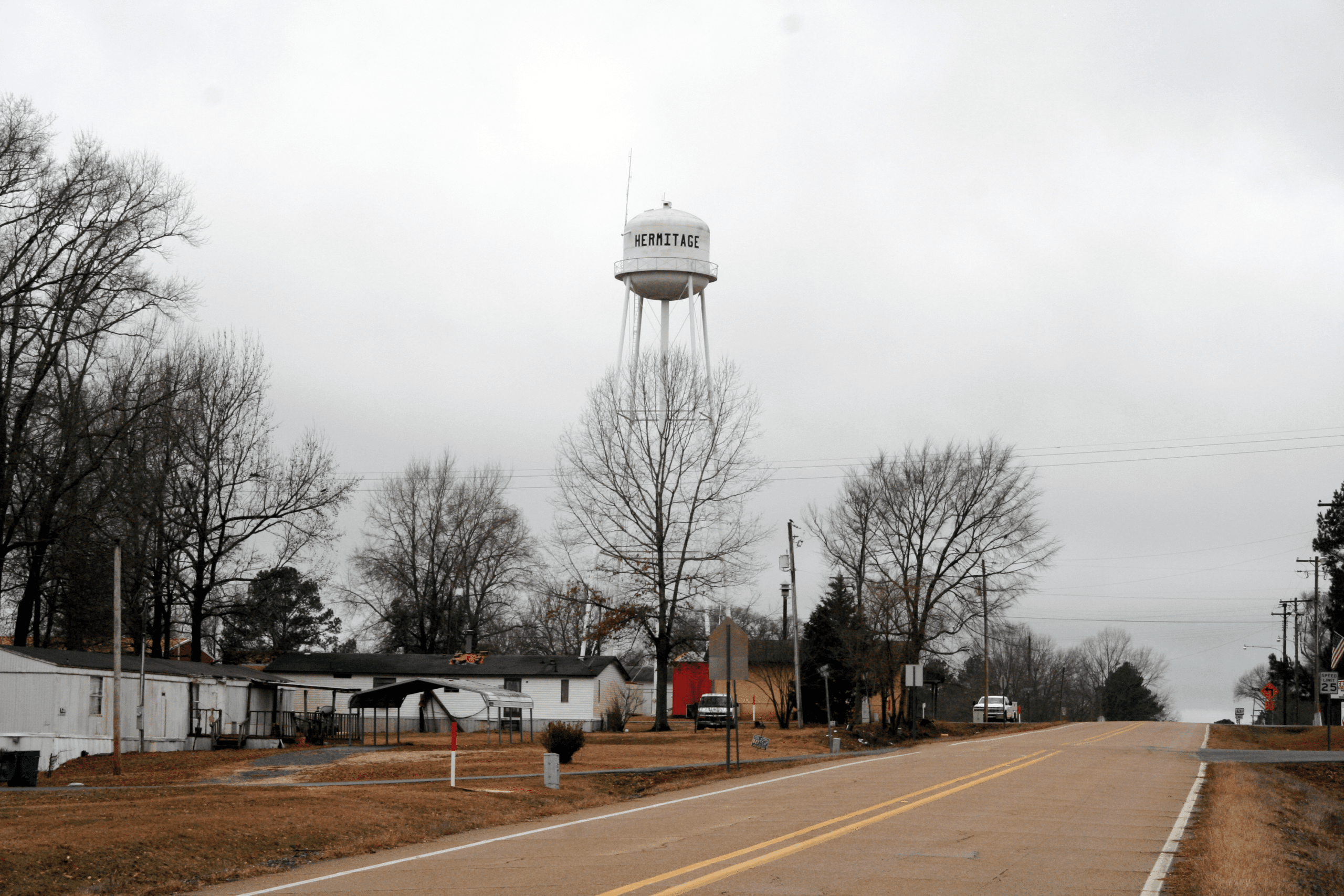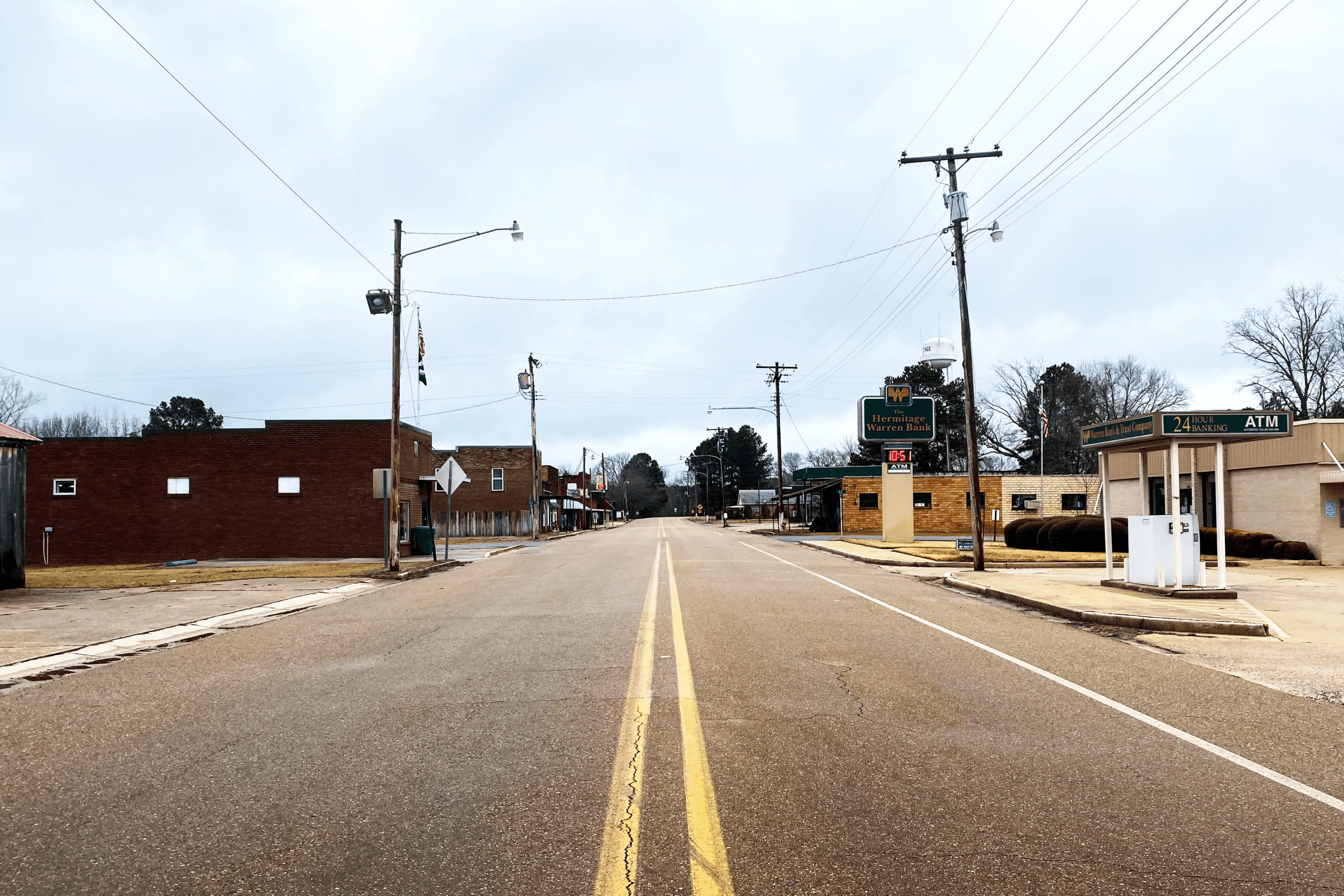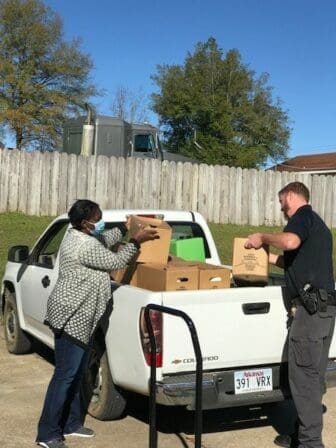Neighbors of Hermitage

The city of Hermitage, Arkansas, planned for emergencies.
Being part of “Tornado Alley” in Arkansas means expecting severe storms every spring and being equipped with storm shelters, generators and emergency plans.
Such emergencies aren’t unusual, and as each storm came through, it wasn’t enough to stop the city from working toward its goals.
What made 2020 unusual was to facing damage from severe storms while coping with a pandemic. Businesses were forced to close for months. Residents were encouraged to stay at home, and people were asked to maintain a physical distance of at least six feet.
One-Two Punch
The first of two rounds of storms came through in early April 2020, with damage reported from flash flooding.
COVID-19 complicated the response to severe weather. Under normal circumstances, residents in vulnerable housing would use the city’s emergency shelter at the community center during a severe storm. The need to maintain physical distance between each household changed the situation. Putting people into one shelter was risky, primarily since it wouldn’t be known if someone had COVID-19 but was not showing symptoms was among those being sheltered. There wouldn’t be time to test everyone who entered the shelter.
City officials hoped the shelters wouldn’t be necessary and the storms would pass without significant damage.
On April 12, 2020 — Easter Sunday — a round of severe storms powered through southern Arkansas, high winds and tornados causing damage and leaving thousands without power.
The city of Hermitage was among the areas hardest hit.
The Aftermath
The storms left a swath of destruction, with trees and power lines down throughout Hermitage and Bradley County. Tree limbs and downed power lines damaged cars and buildings roads were blocked, including U.S. Highway 63, which nearly divides the city. The closure made it difficult to access areas north of the city.
Straight-line winds caused the destruction. Winds in and around Hermitage ranged from 70-95 mph.
Despite COVID-19, city officials opened the local community center as a storm shelter. They required all those entering to wear a mask and to maintain a safe distance while in the shelter. But the option of keeping it closed would have risked lives during the storm.
Hail fell during the storm, damaging crops on nearby farms. One farm reported losing all of its crops.
Cleanup began immediately after the storms. City officials and local volunteers brought out chainsaws and other tools to clear streets and neighborhoods of debris. Removing debris and repairing power lines took much longer than expected. Thousands were without power, including residents in and around Hermitage.
One of the biggest problems Hermitage faced after the Easter storms were with its wastewater system. The loss of power meant three lift stations were not functioning.
The system’s emergency generator should power the lift stations, keeping the wastewater flowing at standard pressure. However, the generator failed and required repairs.
City officials wanted to borrow a generator but could not find one because of the demand from thousands of Arkansans without power. Local stores were sold out. After several phone calls, officials found a generator in Conway, nearly 135 miles away. They found other generators in Benton, El Dorado and Crossett. In all, residents, business owners, and city officials traveled hundreds of miles to buy and borrow generators. At the same time, they waited for power to be restored.
Local farmers lent a hand to the city by providing transportation to retrieve fuel to power the generators. One farmer responded almost immediately when city officials discovered they only had fuel for 17 hours’ worth of power. A farmer had just filled his diesel truck, so he pumped some fuel out of his truck into the generator. Other farmers drove to gas stations out of the area to obtain fuel for the city.
Officials scrambled to take care of immediate needs, but new challenges arose after 7 days without power.
Many people had just received their stimulus check from the CARES Act and had purchased groceries. Many people lost their perishable food. The city had to provide large trash containers for people to dump the ruined food.
After the storms, the only gas pumps functioning in all of Bradley County were in Hermitage because of a local gas station generator purchased for emergencies. The generator was able to power one unleaded pump and one diesel pump. Long lines formed at the station, and gas quickly ran out, leaving city officials struggling to find more fuel.
Volunteers drove for miles to gas stations to find diesel fuel for the generators and unleaded fuel for vehicles and equipment for emergency workers clearing debris from city roadways.
A generator borrowed from someone in Redfield — more than 80 miles away — kept the city offices working with one computer and one printer. Crews from around the state restored power to Bradley County and Hermitage on April 17.
Addressing the City’s Needs
With the worst of the storm damage repaired, Hermitage called Communities Unlimited to assist in preventing issues in the future. The city wanted to apply for emergency grant funding to purchase a new generator to power city hall.
Hermitage worked with Communities Unlimited to apply for a U.S. Department of Agriculture-Rural Development (USDA-RD) Community Facilities Technical Assistance and Training Grant (CF TAT). The program identifies community facilities’ needs in rural areas and provides grants to support the community in meeting them. Hermitage officials requested $26,389.60.
Hermitage needed a new police vehicle. Communities Unlimited assisted Hermitage in submitting a second CF TAT application on May 29, 2020, to purchase the vehicle. In July, the city was approved for a loan toward the vehicle’s purchase from the Communities Unlimited Community Loan Fund. Part of the money would serve as the city match for the grant they were hoping to be awarded by USDA-RD. Less than a month later, they were awarded a $36,750 grant to cover the rest of the vehicle’s cost.
toward the vehicle’s purchase from the Communities Unlimited Community Loan Fund. Part of the money would serve as the city match for the grant they were hoping to be awarded by USDA-RD. Less than a month later, they were awarded a $36,750 grant to cover the rest of the vehicle’s cost.
The police vehicle funding came as the city waited on word on funding to extend the sewer system and make much-needed improvements to the existing system. Communities Unlimited assisted the city in applying for a Community Development Block Grant (CDBG) and a grant and loan from USDA-RD to cover the wastewater system’s improvement and expansion costs.
In August 2020, the city received a CDBG grant for $358,640 toward the wastewater system’s improvement costs. About the same time, they also received word that they would rec eive a loan for $499,000 from USDA-RD. The city is currently waiting on their Letter of Conditions (LOC) for the loan. Hermitage is expecting construction to take place sometime in 2021.
eive a loan for $499,000 from USDA-RD. The city is currently waiting on their Letter of Conditions (LOC) for the loan. Hermitage is expecting construction to take place sometime in 2021.
The city wanted to keep accurate records of water faucets, outdoor electrical outlets, and other assets available to the community. Communities Unlimited provided an R1 GPS receiver and two tablets for GIS mapping of community assets. Trent Neatherly, GIS Technician with Communities Unlimited, visited the city to train city officials on GIS mapping.
Communities Unlimited also worked with Hermitage to become a part of the USDA’s Farmers to Families Food Box program. The program provides boxes of foods to communities to distribute to families in need. Hermitage took part in the program and distributed 3,000 boxes of food to its residents and surrounding communities in Bradley County in November and December 2020. City officials and community volunteers dropped boxes at the homes of elderly residents and residents in remote areas without transportation.

